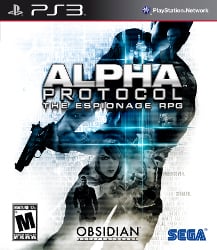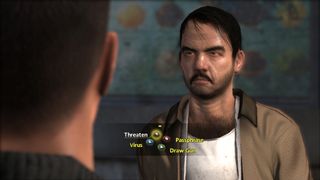
A secret agent role-playing game sounded like a good fit for Obsidian Entertainment. Their previous games found fresh story material in the well-worn lore of Star Wars (Knights of the Old Republic II) and Dungeons and Dragons (Neverwinter Nights 2). Surely they'd be able to carve a rich plot from something as cliche as a secret agent betrayed by his superiors...right?
Alpha Protocol is the name of this covert operative's employer, a shadowy agency so shadowy that even the other shadowy agencies haven't heard of it. If infilitrated by a mole, then the agency has to be dismantled and reformed under a new name from scratch. There have been several Alpha Protocols actually, though obviously not using that same name. This process of destroying and rebuilding, which your new recruit character is told about five minutes after being recruited, is also called "Alpha Protocol." This is confusing but relatively minor compared to some of the story's other problems.
The main character (a GQ-looking dude named Michael Thorton) is set up by someone in the agency and is forced to go on the run. I try to avoid revealing plot details in reviews but considering the story is supposed to be the strongest part of this game, it can't go unexamined. A single-playthrough takes probably fifteen hours and with a length about seven times that of a James Bond film, you'd expect more depth to the narrative. You would also expect the bulk of the plot to be devoted to Thorton trying to discover the extent of this conspiracy he's been embroiled in. You would be wrong on both counts. Mikey Thor discovers early on that the ultimate culprit is the Halbech Corporation, a private military contractor and arms dealer that is stirring up shit because wars translate into better profits for them. Thorton spends the game traveling the world and trying to stop all these elaborate, World War III-causing machinations by Halbech that will somehow make them slightly richer.

Seriously? Another evil corporation? Even the PMC angle, ripped from the headlines as it is, has been overdone in the past few years. You might defend it by saying, "Coulda been worse. They might've used Triads, Arab terrorists, or Russian mobsters." However, all of those groups make appearances in this game too. Thorton enjoys a love-hate relationship with them: on the one hand, they can help him in his quest against Halbech...on the other hand, they're all completely evil. The writers are forced to make Halbech into this cartoonish, demon corporation to make the other organizations seem like lesser evils. "Sure, those crazy Islamic fundamentalists are killing innocent people by the plane-load...but Halbech wants to DESTROY THE WORLD." It's really clumsy stuff.
While the overall story of AP isn't spectacular, the individual characters are intriguing. It's usually due to a combination of three reasons: they have a vivid personality, their voice-acting is strong, or they simply look cool (this one Chinese agent had a really awesome cape). Perhaps I liked the cast more than warranted because I wasn't given enough of a chance to get to know them. Conversations are a small, controlled resource in this game. You can't wander around town to talk to characters (you teleport directly from your lonely safehouse to mission locations) and you can't call them up on your cell phone. Every conversation you have in the game has been deliberately placed within the campaign; you can't initiate your own. I suppose I've been spoiled a bit by the talkative NPC's of games like Dragon Age, who will tell you their whole background if you're persistent enough. Considering Thorton usually works alone, the game can feel a bit lonesome. Villains go underdeveloped (my reaction to the last boss: "Who are you, again?") and so do the women you might take as lovers. I suppose believable romance isn't the objective here, though; you get an Achievement/Trophy for sleeping with all four possible love interests in one play-through.
Your standing with the NPCs of Alpha Protocol (and the organizations they represent) is determined primarily through conversations. Like Mass Effect, you're given choices throughout dialogues that in turn change how NPCs respond to you. It's different than other "dialogue wheel" games in two respects, though: you don't get to preview the text of your conversation choices and your decision time is limited. You've got about five seconds to make your choice. While ME might present dialogue options as a series of keywords (for example, accusing a suspect in an interrogation would show up as "accuse"), AP usually presents the player with a choice of attitudes. The three main attitudes for a conversation are Suave, Aggressive, and Professional.
The time limit worked for me. In the real world, someone's not going to continue a conversation with you if it takes you more than five seconds to respond. More than likely, they'd thank you for the beer you bought them and rejoin their friends (sob). Realism, by itself, is a poor reason for including something in a game, though. Fortunately, this little conversation "shot clock" has another redeeming quality: it's kind of fun. It adds a bit of tension to the conversation. Like a bomb defusal expert trying to decide between cutting the red and green wire, I'd agonize over whether I should play it cool with the busty mercenary or tell her I like her pink sunglasses.
CINEMABLEND NEWSLETTER
Your Daily Blend of Entertainment News

The Aggressive-Suave-Professional conversation model is a needed break from the usual Good-Neutral-Evil responses we're given in ME and other games of its ilk. The former keeps you on your feet. If you're playing a good character in Knights of the Old Republic, you're always simply selecting the "good" choices in dialogue. In AP, though, there's rarely a "good" option because the game doesn't really care about your karma. Thorton's a bullshit artist who's trying to get what he needs from this different characters and that requires him to act differently depending on his audience. The exact approach required to talk your way through a situation varies not only from character to character but also from moment to moment.
My beef with the dialogue centers on the three categories the developers choose. They're not very clear choices. On the surface, Professional and Aggressive seem to overlap a lot; Thorton kills people for a living so acting professional is pretty damn aggressive. Over time you'll learn the difference, though: Aggressive is bad-assy growling while Professional is generic and noncommittal. Neither is a very tempting option but it's safer than going with Suave, a weird grab bag category that seeks to bridge the gap between shooting people in the knees and acting like a process server. The dictionary definition of "suave" is "smoothly agreeable or polite; agreeably or blandly urbane. Obsidian takes this to mean "douchebag." Suave conversation options alternate between bad jokes ("Sorry for not getting up," Thorton says while strapped to a torture bed.) and clumsy attempts at getting laid. It's nice that they give you dialogue choices but it'd be better if they were attractive choices.
Your decisions extend beyond Thorton's personality. You're also asked to pick his skillset. At the start of the game you pick a background to slant his skills in a particular way (for example, the soldier background makes him better with weapons). Throughout the game, you'll then earn points that can be used to enhance these talents. The nine skills fit into three basic categories: weapons, stealth, and techie crap (lockpicking, hacking, setting traps). A system like this seems to lend itself to Deus Ex gameplay, with multiple ways to complete a mission. In practice, this doesn't happen.
The issue is that the different categories of skills don't lead to different strategies. You can still hack computers even if you don't have a single point invested in that skill. Therefore, the game has no incentive to provide a workaround solution for players who aren't tech specialists. In Deus Ex, a lack of hacking skill meant that you couldn't hack at all; as a result, you wouldn't be able to reprogram a robot sentry and would end up having to fight it or sneak around it. In AP missions, your character can pretty much do everything - your skills are just determining what will be easier for you to do. One play-through of a mission will be about the same as the next, aside from the big decisions you make at the end (e.g. kill the arms dealer or accept a bribe and let him go).

These choices have real consequences for your mission, big and small. Killing the arms dealer might deprive you of some nice weapons or cash but it will ultimately make the world a bit safer to have fewer illicit weapons floating around. The effects of player's choices are summed up in an epilogue during the end credits. It's a good way to pat the player on the back for a job well done. Hypothetically, it also encourages you to replay the game so you can see how making different decisions affects the epilogue. I had zero desire to replay the game, though.
Why wouldn't I replay the game? Well, it's because it's not all that great even the first time through. AP is behind the curve as a third-person shooter and a stealth game. Enemies stand still even when you toss a grenade at their feet. You can only climb up or drop down from ledges at specific locations marked with a floating arrow. Thorton is unable to look through keyholes or shoot lights. In fact, light seems to have no effect on your visibility to enemies - wait, what the hell does, then? Upon reaching a checkpoint, the door behind you will close permanently and you won't be able to backtrack. Except at high levels, hand-to-hand combat consists of hitting one button over and over while your opponent chain-blocks.
AP has one thing in common with some of the best RPG's ever made: it's very broken in its unpatched state. It's powered by the Unreal Engine 3 and displays the common texture pop-in issue, though it's more persistent than in any other UE3 game I've played. In bigger firefights, the framerate slows to a crawl. Save often because the game will crash a couple times in the campaign. Enemies get stuck on the environment and will just wait there, motionless, for you to walk up and kill them. This doesn't compare to what happened with the final boss, though; he stood there and stared at me while I shot him in the face. Truly a battle for the ages.
Alpha Protocol has the basic characteristics that make Western RPG's so appealing - character customization, branching storylines, and genre-bending combat. Its execution of these principles is very clumsy, though. It's shocking to see such a raw game from a studio as experienced in the genre as Obsidian.
Players: 1
Platform(s): PS3 (reviewed), Xbox 360, PC
Developer: Obsidian Entertainment
Publisher: Sega
ESRB: Mature
Rating:

Staff Writer at CinemaBlend.

The WWE's Women's Royal Rumble Just Crowned Its Champion, But I'm More Psyched About The Major WrestleMania 41 Feud It Set Up

‘Leave That Man The F--- Alone’: After Scottie Pippen Claimed Neither Michael Jordan Nor LeBron James Is The Basketball GOAT, Carmelo Anthony Shared Thoughts

I Didn't See Elsbeth's Meghan Markle Joke Coming, But There's A Whole Story Behind Why It Makes Sense
Most Popular







